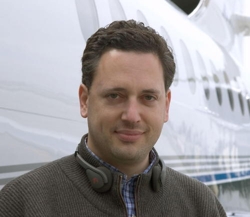Yammer founder David Sacks just left the stage at the Launch conference in San Francisco, where he talked about his future at Microsoft and also weighed in on some hot tech topics, including Yahoo CEO Marissa Mayer’s new ban on working from home.
As someone with a startup background (he was chief operating officer at PayPal, founded Geni.com, and is an active angel investor), you might expect that Sacks’ time at Yammer, now that it has been acquired by Microsoft, to be limited. Or maybe, as on-stage interviewer Jason Calacanis suggested, Microsoft is hoping Sacks can help turn the company around and is grooming him for a bigger executive role.
Sacks basically denied both suggestions — he said that he’s still “really happy doing what I’m doing” (running Yammer within Microsoft) and that he’s “looking forward to doing that for a while.” As for whether he’s the next Steve Ballmer (in a good way), he said, “There’s a lot of people who have much more important jobs than I do at Microsoft.”
Changing topics, you might expect Sacks to be against Yahoo’s new anti-work-from-home policy, since Yammer can help geographically distributed teams work together. However, Sacks said Yahoo’s move seems like “an easy decision” — management looked at the data and saw that people working from home weren’t logging in, so they couldn’t tell what those employees were doing.
“What is everyone complaining about?” Sacks asked.
Calacanis also asked about Sacks’ much-discussed Facebook post last year, where he said, “I think silicon valley as we know it may be coming to an end.” Sacks said today that what he had in mind was the fact that the big tech companies — Amazon, Apple, Facebook, Google and Microsoft — now have “so much surface area to their products that it’s easier for them than ever before to feature-ize you.”
That doesn’t mean you can’t compete at all, he added. First of all, taking lessons from Yammer’s history, Sacks said that you want to start with an idea that’s not on a big company’s “near-term product roadmap,” because “when you first launch, your product is easy to copy.” For example, when Yammer launched at the TechCrunch50 conference in 2009, a team of fewer than 15 people had been working on it for about nine months: “If a big company had moved quickly enough, they could have crushed us.” But that didn’t happen.
Then, after you launch and get a sense that you’re on to something, you want to deepen the product and add features as quickly as possible, so that copying you becomes much tougher. For example, Sacks argued that by the time Salesforce.com was advertising its own business social network Chatter on the Super Bowl several years later, the company was trying to compete with “Yammer 2008,” not what Yammer had become.
Sacks said that another opportunity for startups is Marc Andreessen’s idea that “software is eating the world.” In other words, even though big companies are expanding into more and more industries, there are also more areas that software startups can take on.
“I don’t want to seem pessimistic,” Sacks said. “I’m very optimistic about that.”
Speaking of Sacks’ role as an investor, he also announced that moving forward, he will be investing $50,000 in each of the top five startups at Launch, as chosen by Calacanis.
